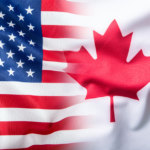How Businesses In Canada Can Support Each Other Amid Potential U.S. Trade Tariffs
Updated March 10th, 2025
With the reintroduction of U.S. trade tariffs on certain Canadian goods and resources in 2025, these tariffs (and reciprocal surcharges etc.) could disrupt supply chains, increase costs, and put pressure on manufacturing and other industries on both sides of the border. Businesses in Canada must collaborate and find strategic ways to support each other, ensuring economic resilience in the face of uncertainty. As a Canadian-owned and operated temporary and direct hire staffing company, ABL Employment is well-positioned to help companies across Canada network, collaborate, mitigate risks and maintain stability amid these challenges.
Impact of Tariffs on Canadian Business
The manufacturing sector is expected to be among the hardest hit, particularly industries reliant on cross-border trade, such as automotive, machinery, and electronics. Rising costs may lead to higher consumer prices and potential job losses. In response, Canada has announced its own tariffs on U.S. goods, including lumber, plastics, and various consumer products like vegetables, alcohol, and appliances. Additionally, several Canadian provinces have implemented their own measures, and are reviewing procurement contracts with U.S. suppliers. Surcharges on electricity generated in Ontario and sent to certain US states have also been implemented, and more surcharges are threatened.
How Canadian Businesses Can Support Each Other
To counteract the negative effects of tariffs, businesses can take proactive steps to strengthen domestic partnerships and reduce reliance on U.S. imports.
1. Strengthen Domestic Supply Chains
- “Canadianize” our supply chains wherever possible: Companies should prioritize sourcing materials and products from domestic suppliers to keep jobs and revenue within the country.
- Made In Canada vs Product of Canada: Understanding the difference between these two legally defined terms will help shoppers make informed choices about how they spend their dollars. Businesses can support this with in-store labeling/signage. This article explains that:
A “Product of Canada” label means at least 98 per cent of the total direct costs of producing the item were incurred in Canada. Essentially, it was made in Canada by Canadians, with negligible imported elements.
“Made in Canada,” meanwhile, means it was more than half of the total direct costs — at least 51 per cent but less than 98. - Buy Canadian – There’s an app for that! For regular consumers, there are “Buy Canadian” apps such as “Buy Beaver” and “O SCANada”, developed by Canadians, that allow the consumer to scan a barcode on the item to see how Canadian it is. (You have to appreciate the humour in the names!)
- Collaborative Procurement: Businesses in similar industries can pool resources to bulk-purchase supplies at lower costs.
2. Reduce Workforce Costs & Improve Flexibility
- Utilize Temporary Staffing: Tariffs may cause fluctuations in demand, requiring companies to scale their workforce accordingly. ABL’s temporary staffing solutions help businesses adjust without committing to permanent hires.
- Minimize Overtime Costs: Instead of overextending payroll budgets and existing employees, businesses can bring in temporary workers during peak periods.
3. Build Industry Alliances & Advocate for Policy Support
- Cross-Canada Collaboration Across All Provinces: There are no tariffs on trade between Canadian provinces. But barriers do exist, including inconsistent regulations, rules around transportation and provincial protectionism. Industry groups can push for government policy changes to facilitate easier trade between provinces. Recently, progress has been made on these issues, and we’re looking forward to seeing more action on these items.
- Trade Associations & Lobbying: Industry groups can push for government relief measures such as tax breaks and funding for affected businesses. The CBC reports that “the federal, provincial and territorial governments are also working toward recognizing certified professionals no matter where they received their credentials in Canada. The first ministers directed the committee on Internal Trade — which is responsible for implementing the Canada Free Trade Agreement (CFTA) — to develop a Canada-wide credential recognition plan by June 1.”
- Cross-Sector Collaboration: Businesses from different sectors can share insights and strategies to navigate shifting trade policies.
4. Explore Alternative Markets
- Expand Beyond the U.S.: Leveraging trade agreements like CETA and CPTPP, businesses can explore new partnerships in Europe, Asia, and South America.
- Promote Canadian Goods Nationally & Internationally: Investing in branding and marketing can help businesses gain traction in new markets.
How ABL Employment Can Help
As a Canadian-owned and operated temporary staffing company, ABL Employment is committed to helping businesses navigate workforce challenges posed by tariffs. Our services can support affected companies in several ways:
- Flexible Workforce Solutions: We provide temporary, contract, and temp-to-perm staffing options, allowing companies to adjust their workforce based on demand.
- Cost-Effective Hiring: We handle recruiting, screening, and payroll administration, reducing the burden on in-house HR teams and resources.
- Support for Local Supply Chains: If businesses shift to Canadian suppliers, we help ensure they have the qualified staff needed to meet production demands. We can serve as a networking partner to facilitate introductions to like-minded companies across our business community.
- Workforce Transition Assistance: If companies need to restructure due to tariffs, we offer outplacement services and connect workers with new job opportunities.
Strengthening the Canadian Economy Together
By working together, Canadian-based companies can mitigate the impact of U.S. tariffs and build a more self-sufficient economy. Whether through supply chain adjustments, industry advocacy, or strategic staffing solutions, collaboration is key. ABL Employment is proud to be a part of this effort, helping businesses remain resilient and adaptable in uncertain times.
For more information on how ABL can support your business, contact us today!










